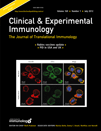
CLINICAL AND EXPERIMENTAL IMMUNOLOGY
Scope & Guideline
Catalyzing Knowledge in Clinical and Experimental Immunology
Introduction
Aims and Scopes
- Immunological Mechanisms in Disease:
The journal publishes studies that investigate the underlying immunological mechanisms of various diseases, including autoimmune conditions, infections, and cancers. This includes research on immune cell function, cytokine profiles, and the role of antibodies. - Clinical Applications of Immunology:
Research that translates immunological findings into clinical practice is a core focus. This includes studies on immunotherapies, vaccine responses, and the use of biomarkers for disease diagnosis and prognosis. - Innovative Techniques in Immunology Research:
The journal encourages the use of cutting-edge methodologies such as single-cell transcriptomics, proteomics, and advanced imaging techniques to elucidate immune responses and their implications in health and disease. - Autoimmunity and Inflammation:
There is a consistent emphasis on autoimmune diseases and inflammatory conditions, investigating the roles of regulatory T cells, B cells, and other immune components in disease progression and treatment outcomes. - Infectious Disease Immunology:
Research exploring the immune response to infectious agents, including viral and bacterial pathogens, is prominently featured, highlighting the interplay between host immunity and pathogen evasion strategies. - Translational Immunology:
The journal aims to bridge the gap between basic immunological research and clinical applications, focusing on how findings can inform treatment strategies and improve patient outcomes.
Trending and Emerging
- Immunotherapy and Cancer Immunology:
There is a marked increase in studies focusing on immunotherapy, particularly in cancer treatment. This includes novel approaches targeting immune checkpoints and the exploration of combination therapies to enhance anti-tumor responses. - Microbiome and Immune Interactions:
Research exploring the relationship between the microbiome and immune function is emerging as a significant theme, with studies investigating how gut flora influences systemic immunity and disease outcomes. - Personalized Medicine in Immunology:
The trend towards personalized medicine is evident, with increasing research on biomarkers that predict patient responses to therapies, particularly in autoimmune and inflammatory diseases. - Inflammation and Metabolism:
The intersection of immunology and metabolism is gaining attention, with studies focusing on how metabolic changes influence immune responses and contribute to diseases such as obesity and diabetes. - Long-COVID and Post-Viral Immunity:
As the understanding of COVID-19 evolves, research on long-COVID and the immune response to viral infections is trending, particularly the implications for autoimmunity and chronic inflammation. - Organoid and Single-Cell Technologies:
Innovative research utilizing organoids and single-cell technologies to study immune responses in tissue-specific contexts is on the rise, providing insights into complex immune interactions.
Declining or Waning
- Traditional Immunological Assays:
Papers utilizing older, less sophisticated immunological assays are becoming less frequent, as newer technologies such as high-throughput sequencing and multiplex assays gain traction for their ability to provide more detailed insights. - Basic Immunology without Clinical Relevance:
Research focused solely on basic immunological principles without clear clinical implications is waning. The journal increasingly favors studies that connect basic science to clinical applications. - Generalized Autoimmunity Studies:
While autoimmune diseases remain a key focus, studies that lack specificity or fail to explore novel pathways are less frequently published, reflecting a shift towards more targeted research. - Single Pathogen Studies:
Research focusing on the immune response to single pathogens without considering broader implications or co-infections is declining, as the field moves towards understanding complex interactions in disease. - Overly Theoretical Models:
The journal is moving away from papers that rely heavily on theoretical models without substantial experimental validation, favoring studies that provide empirical data supporting their hypotheses.
Similar Journals

Immunity Inflammation and Disease
Unveiling cutting-edge research on immunity and inflammation.Immunity, Inflammation and Disease is a premier open-access journal published by WILEY, dedicated to advancing the field of immunology and allergy. Launched in 2013, this journal has established itself as a significant platform for researchers and professionals to disseminate high-quality research findings and innovative insights that address critical issues in immune responses and inflammatory diseases. With an impact factor that reflects its growing influence and a current ranking in Q3 for Immunology and Q2 for Immunology and Allergy, this journal serves a diverse audience keen on exploring cutting-edge developments. Researchers are encouraged to submit their work to share their findings with a global reach, foster collaboration, and enhance the understanding of immune mechanisms and therapeutic strategies. Accessible since its inception, Immunity, Inflammation and Disease is committed to open science, ensuring that vital research is freely available for the advancement of knowledge within the academic community and beyond.

EUROPEAN JOURNAL OF IMMUNOLOGY
Illuminating the Path to Immunological AdvancesWelcome to the European Journal of Immunology, a premier peer-reviewed journal dedicated to advancing the field of immunology and allergy research. Established in 1971 and published by Wiley, this esteemed journal has been consistently ranked in the top quartile (Q1) across its categories, highlighting its significant impact within the scientific community. With an impressive Scopus ranking, the journal occupies the 64th position in Immunology and Allergy and the 74th in the broader sector of Immunology and Microbiology, demonstrating its vital role in driving innovation and knowledge in immunological studies. The European Journal of Immunology publishes high-quality original research, comprehensive reviews, and insightful commentary, making it an indispensable resource for researchers, healthcare professionals, and students dedicated to understanding the complexities of the immune system. Although not an open-access journal, it offers various subscription options to ensure that institutions and individuals can access pivotal research that shapes the future of immunology.
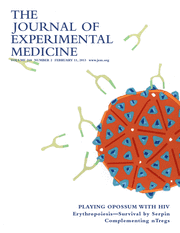
JOURNAL OF EXPERIMENTAL MEDICINE
Elevating Experimental Medicine to New HeightsJOURNAL OF EXPERIMENTAL MEDICINE, published by Rockefeller University Press, is a renowned peer-reviewed journal dedicated to advancing the field of experimental medicine since its inception in 1896. With an impressive impact factor and categorized in the Q1 quartile for Immunology, Immunology and Allergy, and Miscellaneous Medicine, this journal stands at the forefront of medical research and innovation. It provides a prestigious platform for scholars and practitioners to disseminate groundbreaking findings that drive the understanding of disease mechanisms and therapeutic strategies. While the journal is not open access, it maintains high visibility and engagement within the scientific community, fostering collaboration among researchers, professionals, and students alike. The journal's consistent ranking in the top percentiles of Scopus illustrates its significant impact and commitment to excellence in medical research.
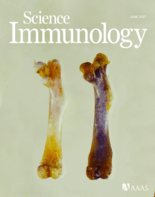
Science Immunology
Transforming Research into Therapeutic InnovationsScience Immunology, published by the American Association for the Advancement of Science, is a leading journal in the field of immunology, recognized for its significant impact and rigor in advancing our understanding of immune responses and complex diseases. With an impressive impact factor that places it in the Q1 category of both immunology and allergy, as well as miscellaneous medicine, this journal is ranked #7 and #8 in their respective Scopus categories, reflecting its high-quality research output. Since its inception in 2016, Science Immunology has been at the forefront of interdisciplinary immunological research, fostering crucial insights that link immunology with pressing health challenges. The journal is committed to providing open access to its content, ensuring that groundbreaking findings are accessible to a global audience of researchers, professionals, and students. Its anthology not only addresses fundamental immunological mechanisms but also enhances the dialogue on translational applications and therapeutic interventions, solidifying its position as an essential resource within the scientific community.
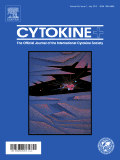
CYTOKINE
Connecting researchers to the forefront of biomedical innovation.CYTOKINE is a prestigious peer-reviewed journal published by Academic Press Ltd - Elsevier Science Ltd, dedicated to advancing the field of immunology, biochemistry, and related biomedical sciences since its inception in 1989. With an ISSN of 1043-4666 and an E-ISSN of 1096-0023, this journal serves as a vital resource for researchers and professionals alike, offering cutting-edge research findings that delve into the roles and mechanisms of cytokines in health and disease. Recognized for its impactful contributions, CYTOKINE currently ranks in the Q2 quartile across several categories, including Biochemistry, Hematology, and Immunology, indicating its significant influence in these fields. Despite not offering open access, the journal maintains a high-quality standard, as evidenced by its robust Scopus rankings, including a notable 80th percentile in Medicine and Hematology. Researchers and students are encouraged to explore the latest findings and methodologies via CYTOKINE, as it continues to shape the future landscape of cytokine research and application.

CANCER IMMUNOLOGY IMMUNOTHERAPY
Leading the Charge in Cancer Immunology InnovationsCancer Immunology Immunotherapy, published by Springer, stands as a premier journal in the fields of cancer research and immunology, holding a prestigious Q1 ranking across multiple categories, including Oncology and Medicine as of 2023. With an ISSN of 0340-7004 and an E-ISSN of 1432-0851, this journal has been a pivotal platform for groundbreaking research since its inception in 1976, continuing to provide insight into the complex interactions between the immune system and cancer. The journal's scope encompasses a wide array of topics, including novel therapeutic strategies, immunological mechanisms, and translational science aimed at advancing treatment outcomes for cancer patients. Renowned for its rigorous peer-review process and high impact factor, it attracts contributions from leading experts and researchers around the globe, positioning itself among the top-tier publications with Scopus rankings that reflect its vital role in advancing the field. Access options are generally subscription-based, ensuring a comprehensive resource for professionals and academics seeking to deepen their understanding and make meaningful contributions to cancer immunotherapy.
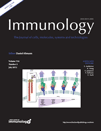
IMMUNOLOGY
Exploring the Depths of Immunological ScienceIMMUNOLOGY is a premier journal published by Wiley that has been at the forefront of the field since its inception in 1958. With an impressive impact factor and classified in the Q1 quartile for both Immunology and Allergy as of 2023, this journal is highly regarded among researchers and professionals alike. It ranks 36th out of 233 in the Medicine/Immunology and Allergy category, and 40th out of 236 in the Immunology and Microbiology segment on Scopus, placing it firmly within the top percentile of its field. The journal is dedicated to publishing high-quality research that advances our understanding of immunological processes, bridging basic science with clinical applications. Although it does not operate under an open-access model, it offers conventional access options that remain integral to the dissemination of vital immunological research. With its broad scope and commitment to scholarly excellence, IMMUNOLOGY continues to serve as an essential resource for those seeking the latest advancements in immunology, fostering innovation and collaboration among scientists globally.

Welcome to Immuno, a pioneering open-access journal published by MDPI that serves as a key platform for the dissemination of innovative research in the fields of immunology, biochemistry, and genetics. Established in 2021, this journal has rapidly established itself within the academic community, currently ranking in the 53rd percentile in Medicine (miscellaneous) and 50th percentile in Biochemistry, Genetics, and Molecular Biology according to Scopus metrics. With a commitment to advancing our understanding of immune mechanisms and their applications in health and disease, Immuno is dedicated to publishing high-quality peer-reviewed articles that contribute valuable insights to both researchers and practitioners. Positioned in the heart of Switzerland, its global accessibility and diverse editorial board are a testament to its aim to promote knowledge exchange among scientists, practitioners, and students alike. Explore the latest discoveries and advancements in immunological research through Immuno, where your contributions help shape the future of this critical area of study.
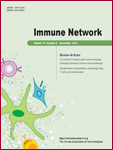
Immune Network
Bridging Disciplines for a Healthier TomorrowImmune Network is a prestigious journal dedicated to disseminating high-quality research in the field of immunology, infectious diseases, and allergy, under the esteemed KOREA ASSOCIATION OF IMMUNOLOGISTS. Founded in 2016, this journal has quickly ascended to a top-tier publication, achieving Q1 rankings in 2023 in multiple relevant categories, including Immunology, Allergy, and Infectious Diseases. With a strong emphasis on innovation and interdisciplinary research, Immune Network appeals to a diverse audience of researchers, professionals, and students keen on advancing the understanding of immune responses and disease mechanisms. However, it is crucial to note that the journal operates under a subscription model without open-access provisions. Its impact factor further solidifies its reputation, reflecting the significant influence of the articles published. Located in South Korea, the journal serves as a global platform for sharing revolutionary insights and fostering collaborations within the immunology community.

BMC IMMUNOLOGY
Advancing Knowledge in Immunological ResearchBMC Immunology is a prominent open-access journal published by BMC that has been at the forefront of immunological research since its inception in 2000. Based in the United Kingdom, this journal aims to advance the understanding of immune system functions and disorders through high-quality, peer-reviewed articles. With an impressive scope encompassing various facets of immunology, BMC Immunology has earned a Q3 ranking in the Immunology category according to the 2023 category quartiles, demonstrating its growing impact and relevance in the scientific community. Researchers and professionals will find valuable insights in its array of published works, spanning both foundational studies and innovative applications. The journal's commitment to open access ensures that cutting-edge research is freely available, fostering collaboration and advancement in the field. For those looking to stay updated on the latest developments in immunology, BMC Immunology stands as an essential resource for researchers, professionals, and students alike.